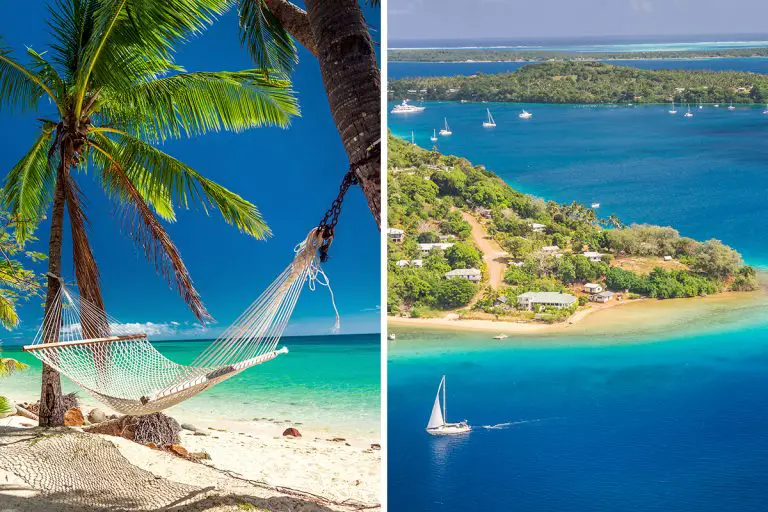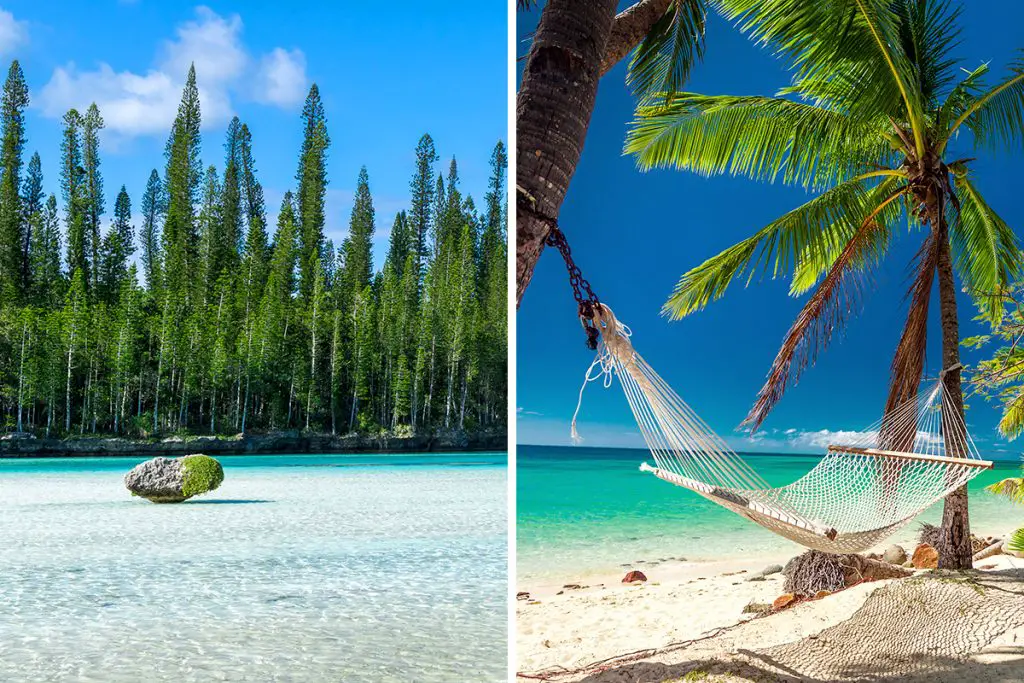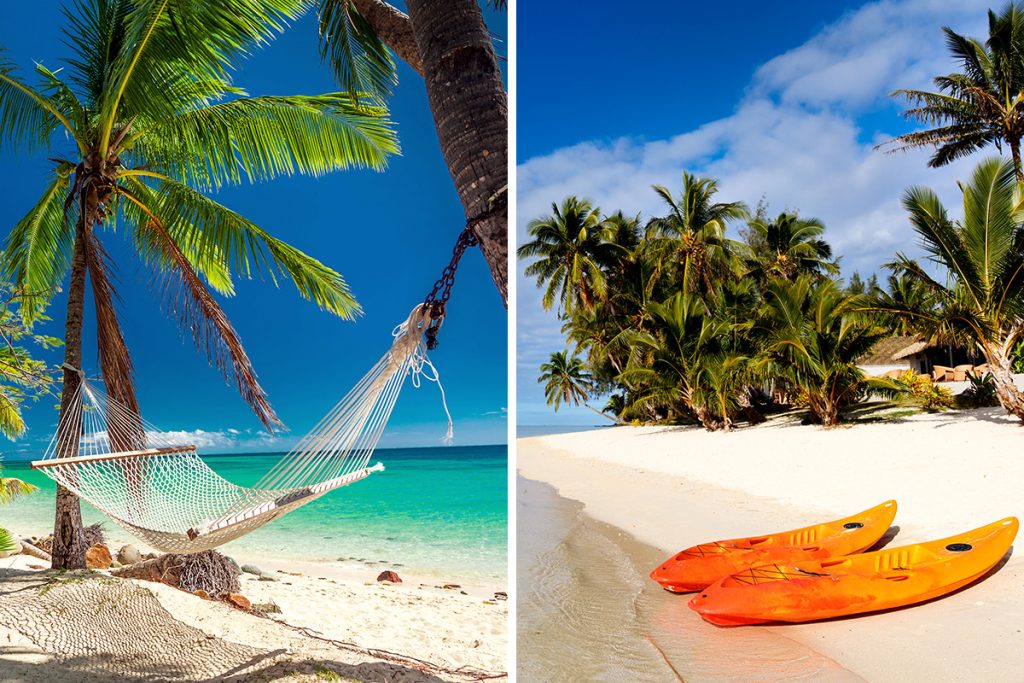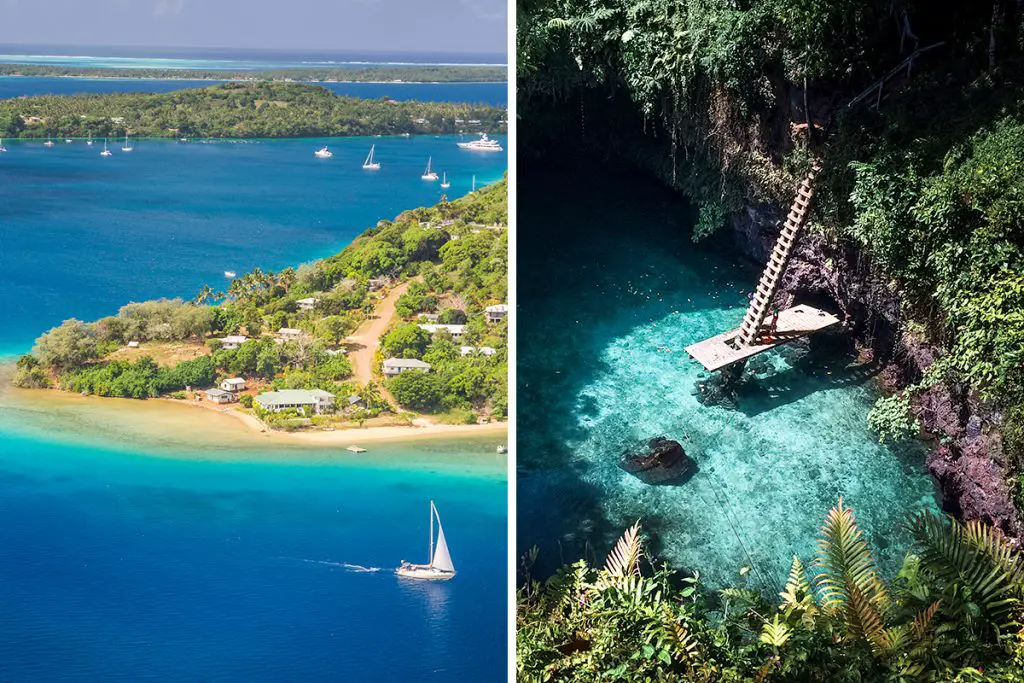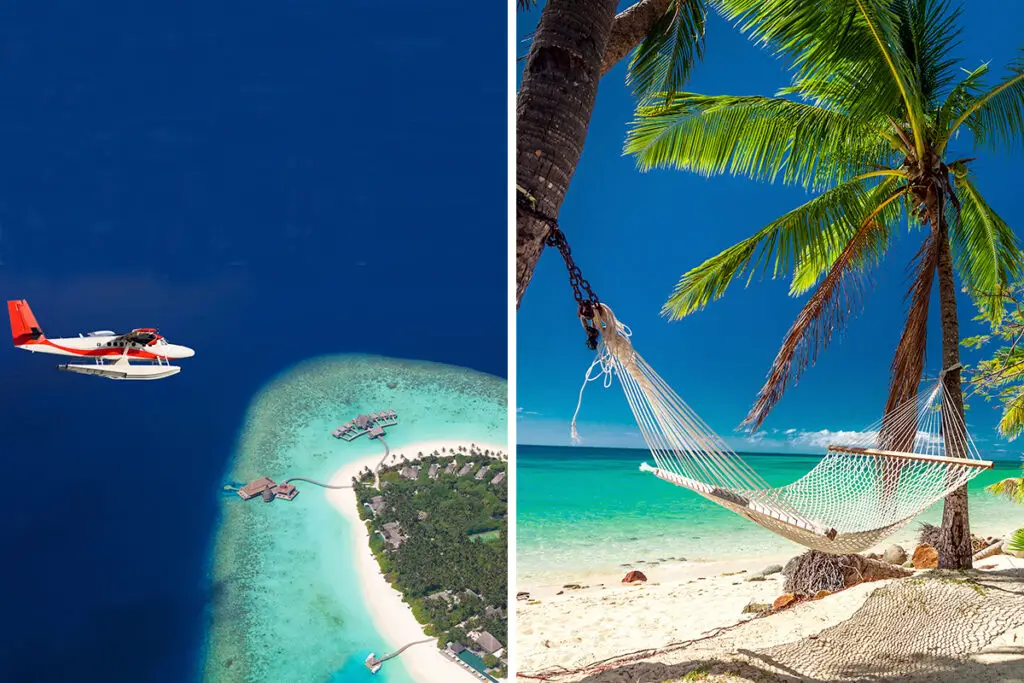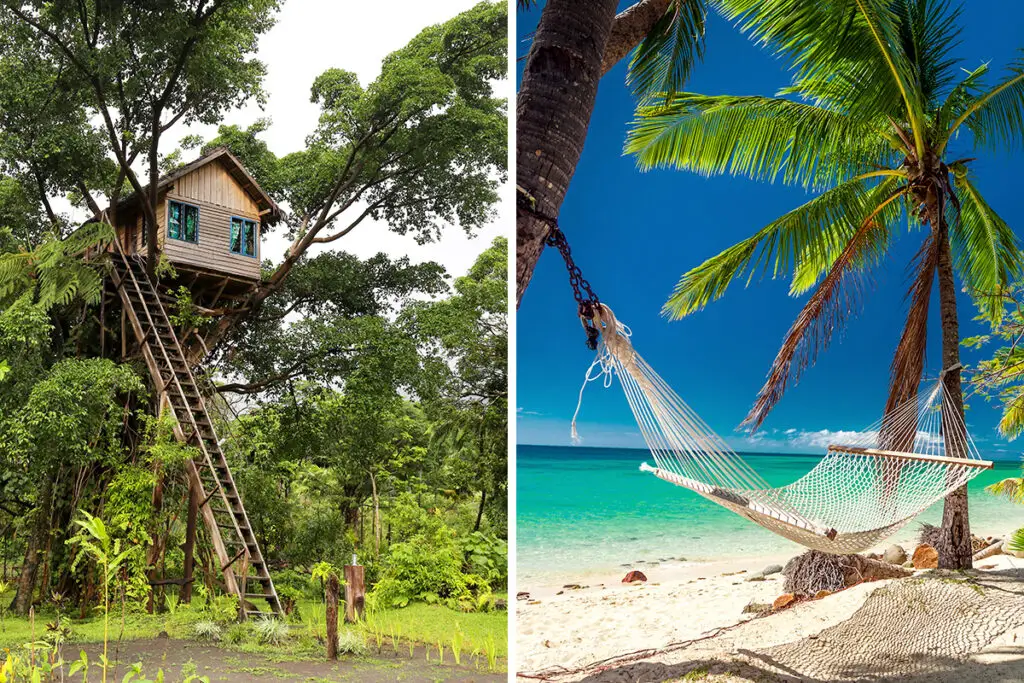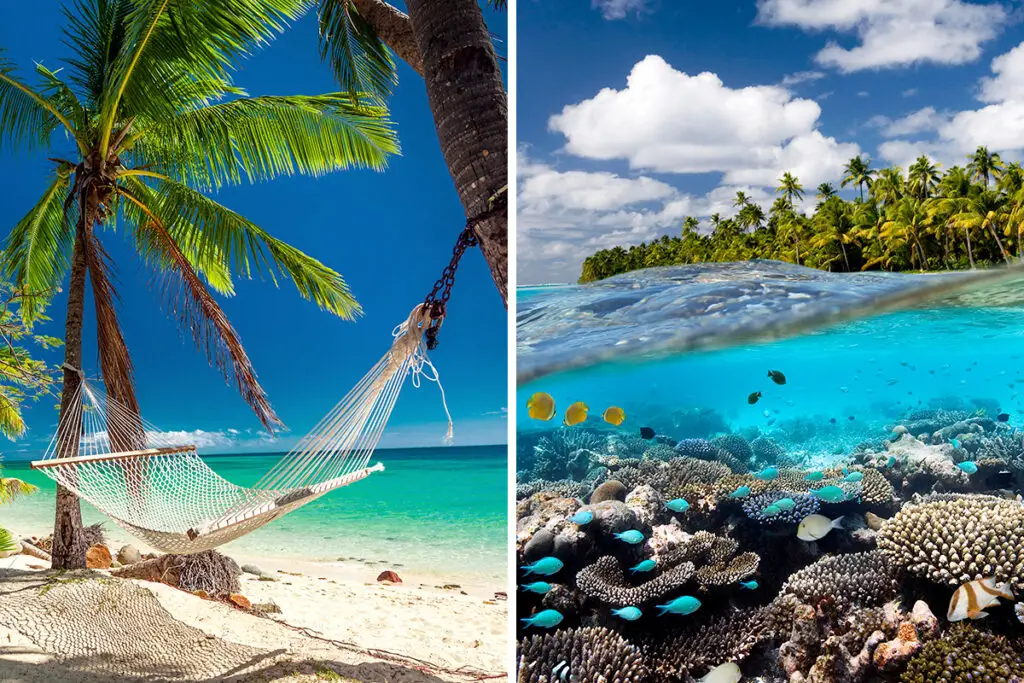Now that’s the million-dollar question, isn’t it? Each of these South Pacific gems offers a distinctive flavor of island life. Fiji, a collection of beautiful islands, radiates a sense of adventure and relaxation. On the other hand, Tonga, the last Polynesian kingdom, is steeped in tradition and history.
Intrigued yet? Hang tight because you’re about to discover the wonders of Fiji and Tonga, and by the end of this journey, you might just find the perfect destination calling your name. Read on, the South Pacific awaits you!
History & Culture
First off, let’s delve into the rich histories and vibrant cultures of Fiji and Tonga. These two destinations can transport you back in time with their tales and traditions.
Fiji’s history is a tapestry of indigenous, European, and Indian influences. From the indigenous iTaukei people to the British colonial era, your curiosity will be piqued. Tonga, on the other hand, is the last surviving Polynesian Kingdom. The people of Tonga take great pride in their heritage, and the monarchy’s influence is still strong today.
Culturally, Fiji is a melting pot, where traditional Fijian customs exist alongside those of Indian origin. This harmonious blend creates a unique cultural landscape that’s fascinating to explore. In contrast, Tonga’s culture remains deeply rooted in Polynesian traditions. The emphasis on family, respect, and strong social hierarchy is evident in everyday life.
Fijian and Tongan cultures both feature captivating traditional music and dance. In Fiji, the ‘meke’ combines storytelling, singing, and dancing. Tongan performances, such as the ‘lakalaka’, are UNESCO-recognized and cherished expressions of their heritage.
Languages also reveal cultural insights. In Fiji, English is commonly spoken, alongside Fijian and Hindi. Tonga, however, has Tongan and English as its official languages, reflecting its cultural preservation.
In a nutshell, Fiji offers a multicultural journey, while Tonga provides a purer Polynesian experience. Both are treasures of the Pacific, each with its unique history and culture worth discovering.
Attractions & Activities
Now, let’s talk about the attractions and activities that Fiji and Tonga offer. Each island group has its own set of adventures and sightseeing gems.
In Fiji, your heart might race in the lush interior, where rivers, waterfalls, and hiking trails await. Zip-lining through the treetops or rafting the Upper Navua River, you’ll get your adrenaline fix.
Tonga, too, isn’t short on land-based adventures. Exploring ancient terraced tombs, tramping through the bush to discover hidden caves, or observing Tongan crafts at a local village are all part of the Tongan experience.
Fiji’s islands, such as the Mamanucas and Yasawas, are renowned for their stunning underwater world. Snorkeling and diving here will reveal vibrant coral reefs and a myriad of sea creatures. Similarly, Tonga’s waters are a haven for marine life. In particular, it’s one of the few places on Earth where you can swim with humpback whales, an experience of a lifetime.
Cultural visits are also a highlight in both destinations. In Fiji, a traditional village visit often includes a ‘kava’ ceremony. Over in Tonga, attending a church service will treat your ears to harmonious singing, a cherished part of Tongan culture.
Whether it’s exploring the land, plunging into the sea, or immersing in local customs, Fiji and Tonga are rich with experiences. Fiji tends to offer more variety, while Tonga gives unique opportunities. Either way, your island adventure will be anything but ordinary.
Beaches
Next up, let’s talk about the gorgeous beaches that you can find in Fiji and Tonga. Both have an abundance of coastline, but each offers a unique beach experience.
Fiji’s beaches, particularly on the Mamanucas and Yasawas islands, are picture-perfect. Imagine soft white sand, palm trees, and clear, turquoise water stretching about 10 miles (16 kilometers). This is your typical Fijian beach. There, you can sunbathe, swim, or snorkel to your heart’s content.
On the other hand, Tonga’s beaches are more rugged and less commercialized. They might not have the postcard-perfect look of Fiji’s, but they offer a sense of tranquility and untouched beauty. Tonga’s Ha’atafu Beach, with its golden sand, is a popular spot for swimming and surfing.
In terms of marine life, Fiji’s coral reefs are a snorkeler’s paradise. With a water temperature of around 77°F (25°C), you can explore the colorful underwater world. Tonga also offers excellent snorkeling opportunities, especially around the Vava’u group where the water is clear, and marine life is abundant.
So, what’s the takeaway? Fiji offers more of the idyllic, resort-style beaches, while Tonga provides a more unspoiled and peaceful beach experience. It’s about your preference – comfort and convenience in Fiji, or raw beauty and tranquility in Tonga.
Eating, Drinking & Nightlife
Moving on to food, drink, and nightlife, let’s see what Fiji and Tonga have in store for you. These are crucial aspects of any holiday, and each destination has its own flavor.
Fijian cuisine is a delightful blend of native ingredients and Indian influences. Seafood, coconut, root crops, and greens make up the basis of their meals. Tongan food, meanwhile, focuses on root vegetables, coconut, and fresh seafood. Traditional dishes, like ‘lu pulu’ (meat wrapped in taro leaves), are a must-try.
In terms of drinking, Fiji is known for its locally brewed beers and kava, a traditional drink with a calming effect. In Tonga, ‘kava’ also plays a significant role in social gatherings, but remember, it’s a drink to be sipped slowly.
When it comes to nightlife, Fiji tends to be livelier. Nadi and Suva have clubs, bars, and restaurants that stay open late. Tonga, however, is more low-key. Its nightlife mainly consists of dining, kava bars, and occasional live music.
To summarize, Fiji offers a mix of local and international cuisines, a vibrant nightlife, and a unique traditional drink. In contrast, Tonga offers a taste of authentic Polynesian food, a quieter nightlife, and its own version of kava culture. Whichever you choose, your taste buds and your evening are sure to be entertained.
Shopping
Let’s take a peek at the shopping scene in Fiji and Tonga. Both destinations offer unique local products that make great souvenirs or gifts.
Fiji, being a larger tourist hub, has a wider variety of shopping opportunities. You can find everything from local crafts to high-end boutiques. A must-visit is the Suva Municipal Market, where you can buy fresh produce, local spices, and handmade crafts.
On the other hand, Tonga’s shopping scene is more modest but equally charming. The Talamahu Market in Nuku’alofa is a fantastic place to pick up traditional Tongan crafts, such as woven mats and tapa cloth.
In Fiji, a popular purchase is the ‘sulu’, a versatile garment that can be used as a skirt, dress, or robe. Don’t forget to also check out the beautifully crafted Fijian jewelry made from local materials like shells and coconuts.
In Tonga, you’ll find beautiful wood carvings, traditional Tongan clothing, and woven baskets. Look out for ‘kafa’, a type of traditional belt made from coconut fibers.
In summary, Fiji offers a wider range of shopping options, including high-end stores and local markets. Tonga, while having fewer options, offers unique, traditional crafts that are hard to resist.
Accommodation
Next, let’s compare the accommodation options in Fiji and Tonga. Both destinations offer a range of options to suit different budgets and travel styles.
Fiji has a broad spectrum of accommodations, from luxury resorts on private islands to budget-friendly guesthouses. You’ll find many of these along the Coral Coast and on the Mamanuca and Yasawa islands.
Tonga, on the other hand, has more modest offerings. You can choose from beachfront resorts, guesthouses, and budget-friendly hostels, mainly found on Tongatapu and Vava’u islands.
In Fiji, many accommodations offer all-inclusive packages, which might be convenient if you prefer having everything sorted. The overwater bungalows are a highlight, offering unparalleled views and luxury.
In Tonga, accommodations are more straightforward but offer a more authentic experience. Staying in a traditional Tongan ‘fale’ (house) can be a unique experience.
In conclusion, Fiji offers a wide range of accommodations, from ultimate luxury to budget options. Tonga, while more modest, provides an authentic local experience. It all depends on what kind of accommodation experience you’re after.
Family-Friendliness & Children’s Activities
The focus now shifts to family-friendly experiences and activities for kids in Fiji and Tonga. Both destinations are fantastic for families, but each offers different experiences.
Fiji is known for its family-friendly resorts. Many have kids’ clubs and offer activities tailored for children. From learning how to make Fijian crafts to participating in exciting water sports, your kids won’t have a dull moment.
Tonga is a little more off the beaten path but still offers plenty for families. Whale watching is a favorite activity for kids and adults alike. Plus, Tonga’s beaches are generally quieter, offering a calm environment for children to play.
Fiji offers more organized activities for children. There are cultural performances, fire shows, and Fijian language lessons. Your kids can have fun and learn at the same time!
In Tonga, your family can enjoy cultural experiences together. From attending a traditional Tongan feast to learning about local legends, these experiences can be both fun and educational.
In summary, Fiji offers a wide array of organized activities and family-friendly resorts. Tonga, on the other hand, provides a more relaxed environment with cultural experiences that the whole family can enjoy.
Getting There & Getting Around
Now, let’s talk about reaching and navigating Fiji and Tonga. These tropical paradises might seem remote, but getting there and getting around is simpler than you might think.
Fiji, being a popular tourist destination, is served by several international airlines. Nadi International Airport is a hub for flights from around the world. The flight from Los Angeles to Fiji is about 11 hours (approximately 5,500 miles or 8,851 kilometers).
Tonga is a bit more off the beaten path. It’s usually reached via a connecting flight from Fiji or New Zealand. The flight from Fiji to Tonga takes about 2 hours (approximately 500 miles or 805 kilometers).
Once in Fiji, you can get around using buses, taxis, or rental cars. For island hopping, there are local ferries and small airplanes. Bear in mind, distances can be deceiving, and travel between islands can take time.
In Tonga, you’ll mostly rely on rental cars, taxis, or bicycles for getting around on the islands. Inter-island travel is mainly by small airplanes or ferries.
In conclusion, reaching and navigating both Fiji and Tonga is relatively straightforward. Fiji, being a larger tourist hub, has more frequent international connections and varied local transport options. Tonga, while a bit more remote, offers its own charm with quieter roads and less crowded transport options.
Weather
The weather is a crucial part of any travel plan. Now, let’s look at the climate in Fiji and Tonga. Both destinations offer tropical weather, but there are some differences.
Fiji experiences a warm tropical climate year-round. Temperatures typically range between 68°F (20°C) and 88°F (31°C). It does have a wet season, from November to April, with more rain and occasional cyclones.
Tonga also has a tropical climate. It’s slightly cooler, with temperatures averaging between 64°F (18°C) and 86°F (30°C). Tonga’s wet season aligns with Fiji’s, running from November to April.
Despite their wet seasons, both Fiji and Tonga enjoy lots of sunshine. Remember to pack your sunscreen!
While Fiji and Tonga have similar weather patterns, Fiji tends to be a bit warmer. Both countries have wet seasons, but this doesn’t mean constant rain. It’s often short showers followed by sunshine.
Safety
Safety is an essential factor when choosing a travel destination. Let’s compare the safety in Fiji and Tonga.
Both Fiji and Tonga are generally safe destinations for tourists. Petty crimes like pickpocketing and bag snatching can happen, as in any tourist location. Always keep an eye on your belongings and avoid displaying valuable items.
Fiji has a higher rate of petty crime in urban areas. It’s recommended to avoid isolated areas after dark. However, tourist resorts and attractions are typically safe.
In Tonga, the crime rate is low. Tongans are known for their hospitality and friendliness towards visitors. However, similar to Fiji, it’s wise to avoid isolated areas at night.
Natural hazards are worth noting too. Both countries are prone to tropical cyclones during the wet season. Always check weather forecasts and follow local advice.
In summary, both Fiji and Tonga are generally safe for travelers, with common sense precautions recommended. Keep an eye on weather conditions if you’re traveling during the wet season.
Cost
When it comes to travel, cost plays a big role in your plans. It’s time to compare the costs in Fiji and Tonga.
In Fiji, your money can go quite far. A meal at a local restaurant could cost around 15 Fijian dollars (about 7 US dollars). Accommodations vary, with budget hotels costing around 120 Fijian dollars (about 56 US dollars) per night.
Tonga, on the other hand, is a bit more expensive. You might spend around 20 Tongan paʻanga (about 9 US dollars) for a meal. Budget accommodations are slightly higher, with prices starting at around 150 Tongan paʻanga (about 67 US dollars) per night.
For transportation, Fiji’s local buses are a bargain, costing around 2 Fijian dollars (about 1 US dollar) for short trips. In Tonga, short bus rides cost around 3 Tongan paʻanga (about 1 US dollar).
In summary, Fiji tends to be a bit more budget-friendly than Tonga. However, the difference in costs is not huge, and both offer value for money, considering their unique attractions.
Which Is Better – Fiji or Tonga?
When it comes to deciding between Fiji and Tonga, it depends on what you’re seeking.
In terms of history and culture, both offer rich experiences. Fiji’s indigenous culture is deeply rooted, while Tonga is the only Pacific nation never colonized by a foreign power.
If you’re an outdoor enthusiast, Fiji offers a wider range of attractions and activities. But if you prefer a laid-back, less commercial atmosphere, Tonga may appeal to you more.
For beach lovers, both destinations offer stunning beaches. Fiji’s are more developed with tourist facilities, whereas Tonga’s offer a more untouched charm.
Foodies would enjoy both destinations. Fiji offers a broader range of international cuisine, while Tonga gives a more authentic local dining experience.
Family travelers might prefer Fiji due to its wide range of family-friendly resorts and children’s activities. But adventurous families would also enjoy Tonga’s unique offerings.
In terms of getting there and around, Fiji is more accessible with more international flights and a well-developed transport network. Tonga is less developed but offers an off-the-beaten-path charm.
So, which is better? If you prefer more activities, family-friendly resorts, and a vibrant tourist scene, Fiji is a great choice. But if you’re after authenticity, cultural immersion, and a slower pace of life, Tonga could be your dream destination. It’s your call, traveler!

